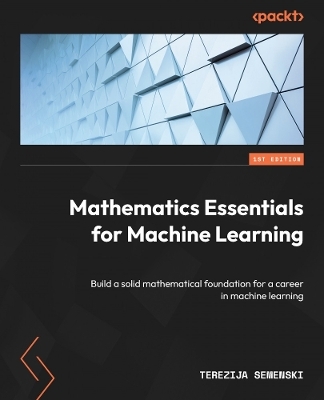
Mathematics Essentials for Machine Learning
Packt Publishing Limited (Verlag)
978-1-83508-843-2 (ISBN)
Key Features
Create effective machine learning models with a robust mathematical foundation
Delve deeper into the underlying mathematics of ML algorithms to gain profound insights
Utilize math skills to implement ML algorithms and secure a machine learning job
Book DescriptionMany machine learning developers and data scientists struggle with core linear algebra concepts and techniques used to design and implement ML algorithms. Instead of covering only theoretical knowledge (definitions, theorems, and proofs), this book will focus on explaining fundamental mathematical concepts with examples while providing scenarios and practice exercises.
To build a strong mathematical foundation you will begin with linear algebra, the fundamental principles of vectors and matrices, including techniques like Gaussian elimination and the Gram-Schmidt process. As you progress, you'll recognise the significance of eigenvalues and eigenvectors in this mathematical framework, which are integral components of understanding machine learning algorithms and their applications. Next, it delves into differential and integral Calculus, leveraging the essence of multivariate Calculus and ML gradients. You will also gain knowledge of probability rules and probability distributions and finally discover the power of statistics from summary statistics to linear regression. Finally, you will gain hands-on experience with popular Python libraries NumPy, SciPy, and Matplotlib by exploring mathematical functions.
By the end of this book, you will master the mathematical concepts to build smart, fast, and efficient ML models.What you will learn
Learn essential linear algebra to understand and create ML algorithms
Understand optimization techniques using calculus operations and concepts
Explore probability calculations and concepts to enhance optimization understanding
Learn summary statistics, quantiles, and different probability distributions
Delve into advanced concepts, like sampling and replacement algorithms, linear regression, and its applications in ML
Implement mathematical functions with Python libraries like NumPy, SciPy, and Matplotlib
Who this book is forIf you are a data science enthusiast software developer who wants to gain practical understanding of mathematical concepts for ML, then this book is for you. In order to get the best out of this book, you should have a basic knowledge of high school mathematics, in particular Algebra and Precalculus. You should also be familiar with basic programming in Python, or a similar language.
Terezija Semenski is currently working as a LinkedIn learning instructor, with over 10 released courses, and as a software developer. She has over 10 years experience as a software developer and QA team lead in the field of machine learning and deep learning across multiple domains. Terezija loves mathematics, teaching, making beautiful charts and engaging in technical discussions with diverse audiences. She lives in Croatia with her husband, daughter, cat, and dog.
Table of Contents
Building a strong foundation in Linear Algebra
Navigating Vectors and Matrices
Implementing Gaussian elimination
Transforming matrices from orthogonality to Gram–Schmidt process
Unveiling Eigenvalues and Eigenvectors
Providing an introduction to Calculus
Applying the power of derivatives and differentiation
Extending to multivariate Calculus and ML gradients
Identifying key components of integral Calculus
Creating key foundations of Probability and the probability rules
Examining fundamental properties of discrete probability distributions
Investigating essential properties of continuous probability distributions
Exploiting the power of the Bayes' Theorem
Introducing Statistics and the summary statistics
Calculating quantiles and correlation
Working with random variables and probability distribution
Implementing sampling and replacement
Applying linear regression
| Erscheinungsdatum | 15.11.2023 |
|---|---|
| Verlagsort | Birmingham |
| Sprache | englisch |
| Maße | 191 x 235 mm |
| Themenwelt | Informatik ► Software Entwicklung ► User Interfaces (HCI) |
| Mathematik / Informatik ► Informatik ► Theorie / Studium | |
| Mathematik / Informatik ► Informatik ► Web / Internet | |
| Technik ► Elektrotechnik / Energietechnik | |
| ISBN-10 | 1-83508-843-0 / 1835088430 |
| ISBN-13 | 978-1-83508-843-2 / 9781835088432 |
| Zustand | Neuware |
| Haben Sie eine Frage zum Produkt? |
aus dem Bereich


